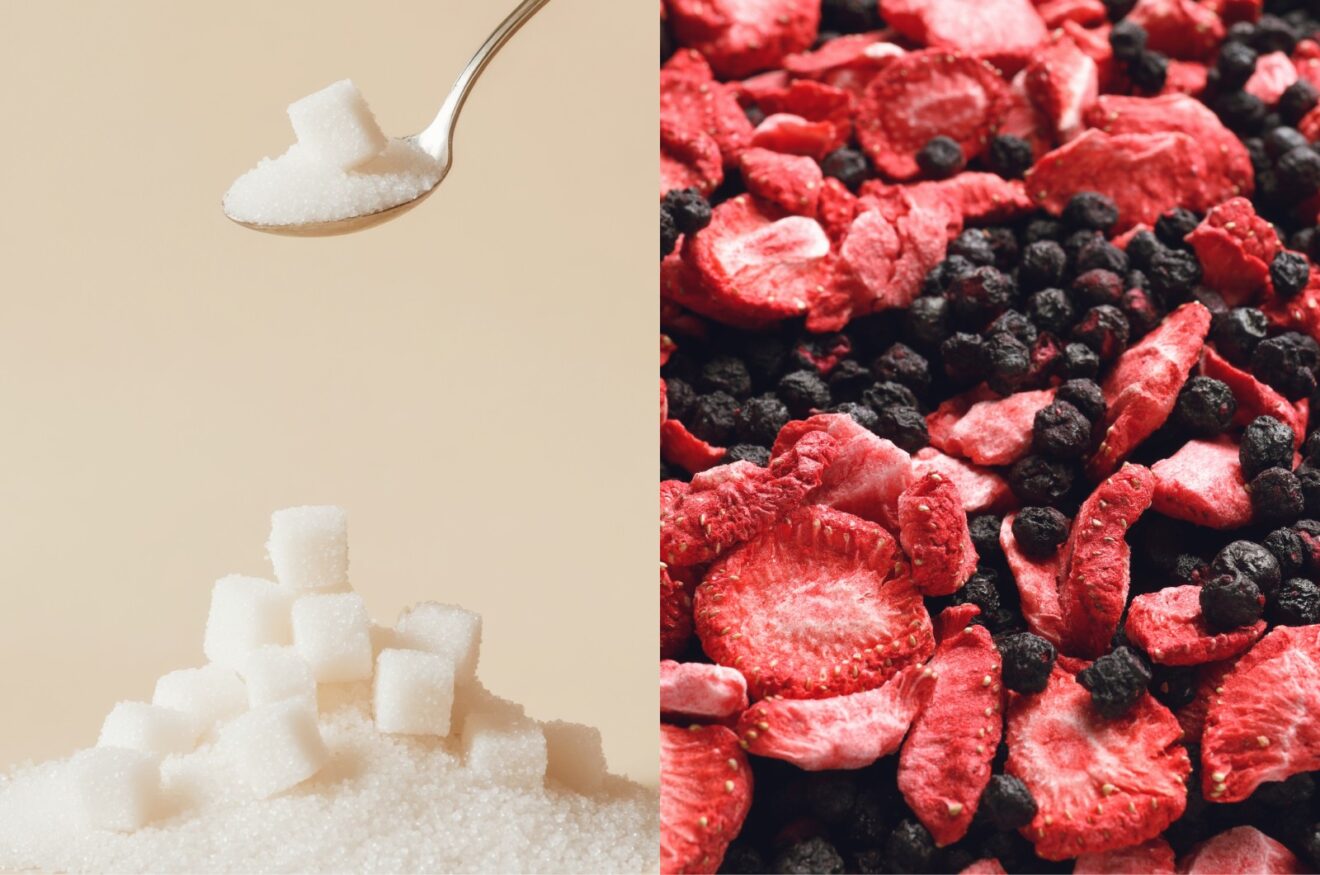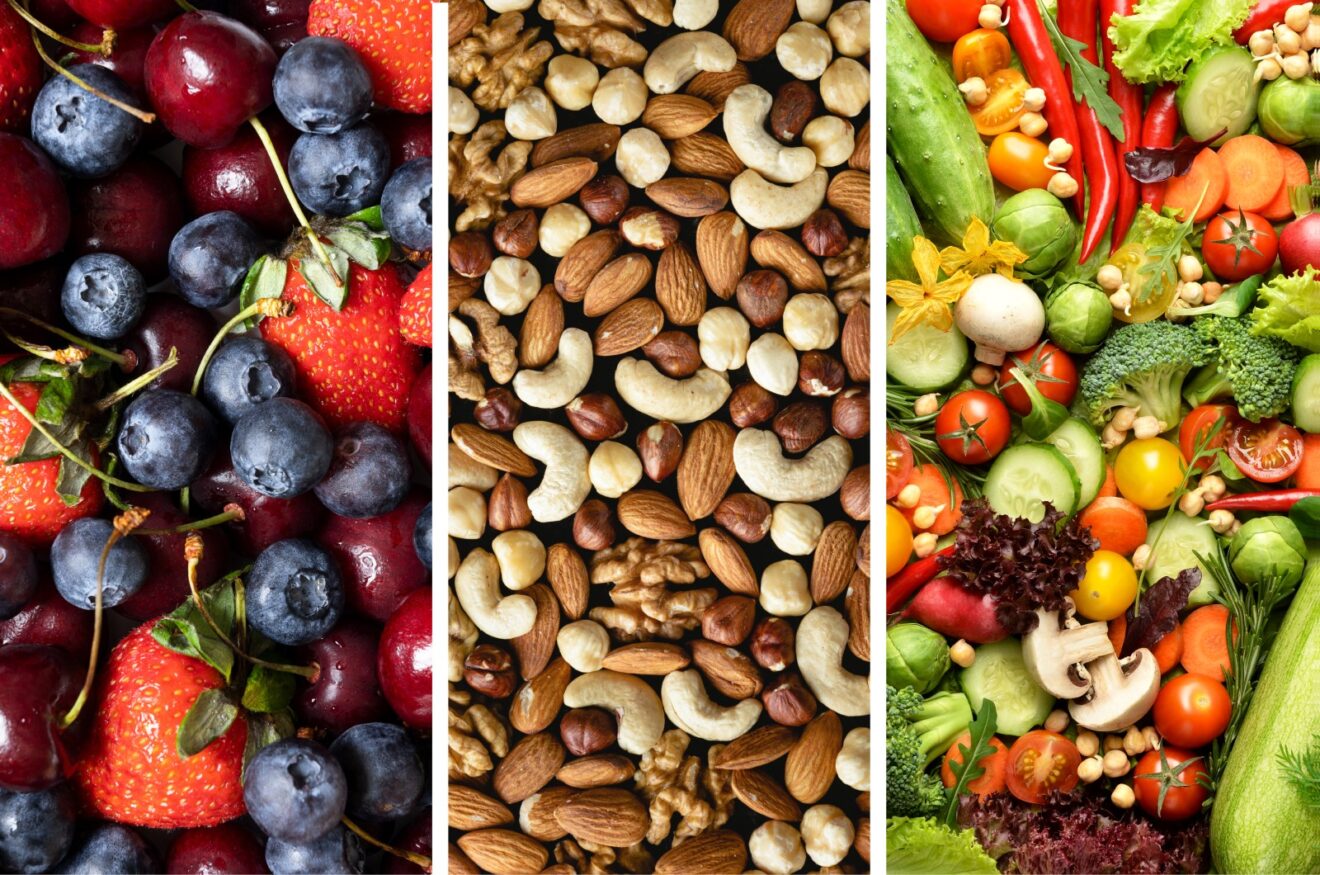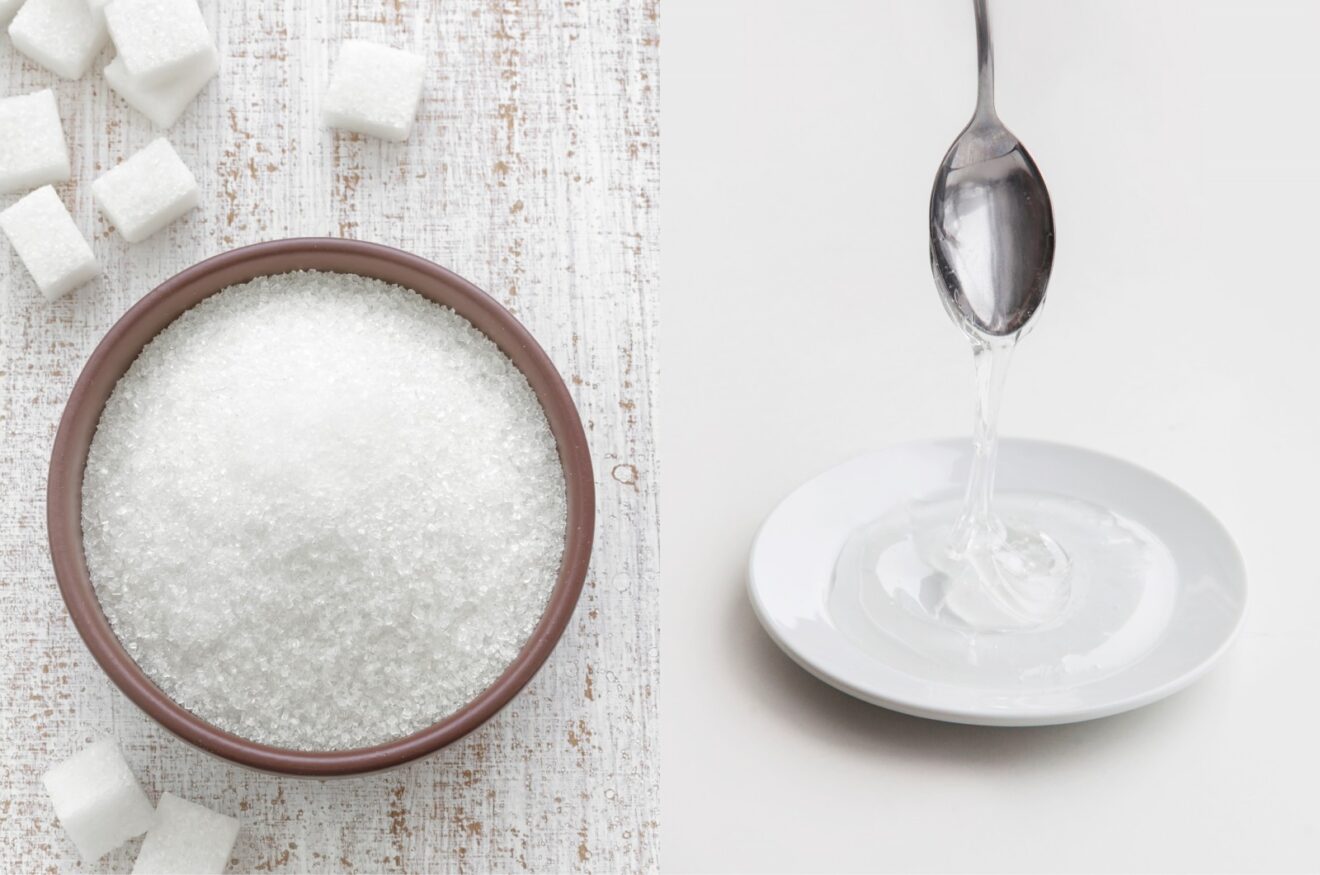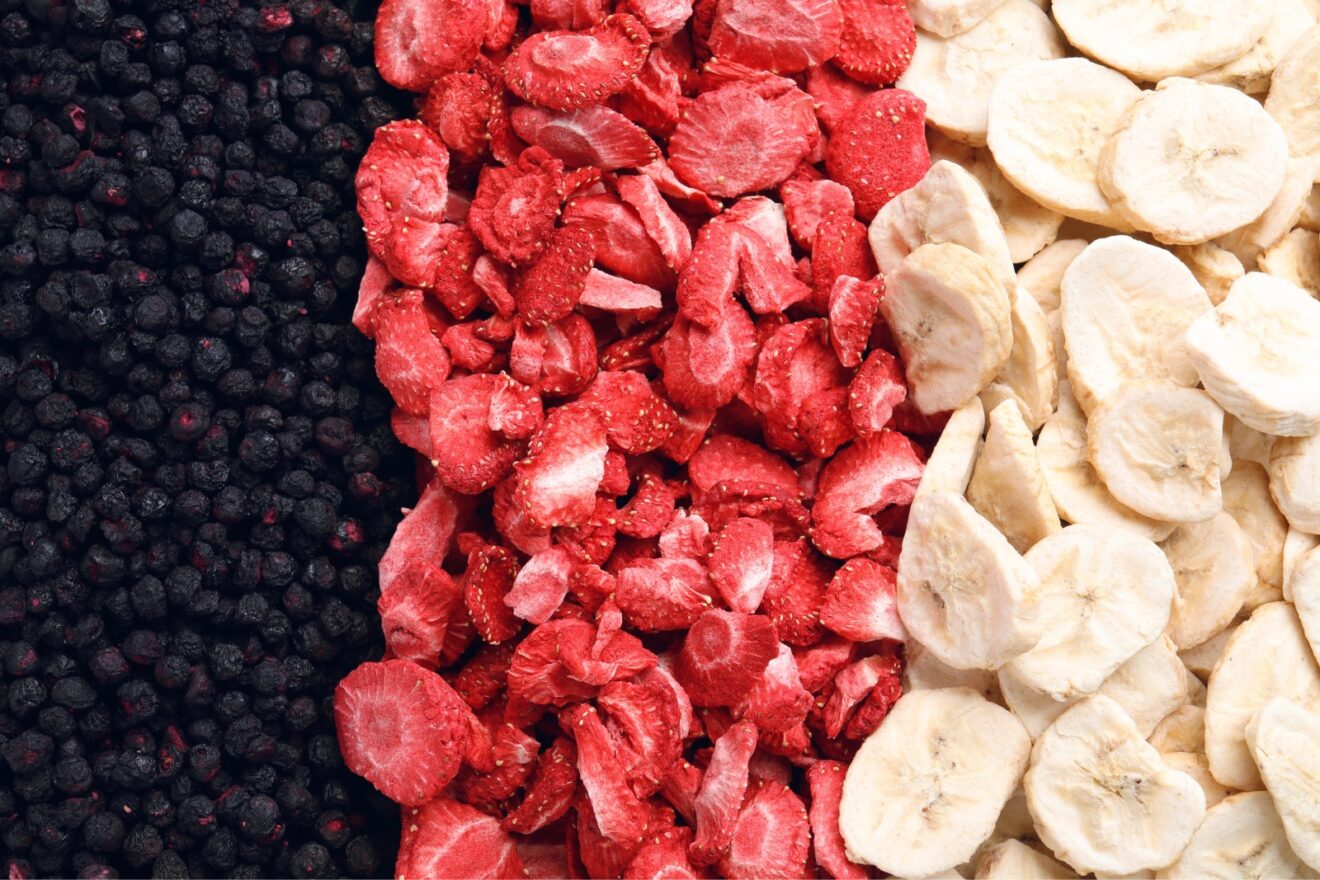Naturally Occurring Sugar vs Added Sugar

Sugar is one of the most debated elements of modern nutrition. While it provides energy essential for daily activities, not all sugars are created equal. Understanding the difference between naturally occurring sugar vs added sugar is key to improving your health and wellbeing.
Naturally occurring sugars are found in whole foods like fruits, vegetables, and dairy, bringing along vital nutrients. On the other hand, added sugars, often lurking in processed foods, are stripped of any nutritional value and contribute to various health problems.
Understanding the Different Types of Sugars
Understanding the chemical structure of sugars helps explain their varying effects on the body. Sugars can be divided into two main types based on their chemical structure:
• Simple Sugars (Monosaccharides and Disaccharides):
These include glucose, fructose, sucrose, and lactose, which are found in fruits, honey, dairy, and sugarcane. They are quickly absorbed and provide immediate energy.
• Complex Sugars (Polysaccharides):
Found in whole grains, legumes, and starchy vegetables, these break down more slowly, providing sustained energy and contributing to better blood sugar regulation.
In the UK, ‘table sugar’ refers to sucrose, a disaccharide from sugarcane or sugar beets, commonly used in households and processed foods.

What Are Naturally Occurring Sugars?
Naturally occurring sugars are sugars found in whole foods such as fruits, vegetables, nuts and milk. Unlike their added counterparts, these sugars are accompanied by beneficial nutrients like vitamins, minerals, fibre, and antioxidants.
For instance, the fructose in fruits comes bundled with fibre, which slows its absorption and prevents blood sugar spikes. This means that eating an apple, rich in natural sugar, is vastly different from drinking a soft drink. Whole foods also contain essential nutrients that support overall health, such as vitamin C, potassium, and flavonoids in fruits, or calcium in milk.
4 benefits of incorporating freeze-dried fruits in healthy packed lunch
Added sugars are those that do not naturally occur in foods but are incorporated during processing, preparation, or cooking. These sugars are commonly used to sweeten processed foods and beverages, including soft drinks, baked goods, and savoury products like sauces and dressings.
Added sugars, particularly glucose-fructose syrup (commonly referred to as high-fructose corn syrup or HFCS), deserve special mention due to their frequent use in processed foods and their negative health impacts. HFCS, a mixture of glucose and fructose, is widely used because of its low cost and sweetening properties. However, it has been linked to liver dysfunction, increased fat accumulation, and adverse effects on the nervous system. Other examples of added sugars include rice syrup, maple syrup, and agave syrup.
Unlike naturally occurring sugars, added sugars provide “empty calories” with no accompanying nutrients and often contribute to health problems such as inflammation, weight gain, and chronic diseases like diabetes and heart disease.

6 Ways Excess Sugar Impacts Your Health
1. Inflammation and Acidification
Excessive sugar intake, especially from added sugars, can promote chronic inflammation in the body. This inflammatory state has been linked to conditions like arthritis, autoimmune diseases, and cardiovascular problems. Additionally, high sugar diets contribute to acidification of the body, which can impair immune function and promote fatigue.
2. Candida Overgrowth
Sugar is a primary fuel for Candida, a type of yeast naturally present in the body. Overeating simple sugars, especially added sugars, can lead to Candida overgrowth, causing symptoms such as fatigue, brain fog, digestive issues, and recurring infections. Breaking the cycle of sugar cravings and Candida overgrowth often requires eliminating sugar (especially added sugars) from the diet.
3. Insulin Resistance and Diabetes
When consumed in excess, sugars overwhelm the body’s ability to regulate blood sugar levels, leading to insulin resistance. This condition increases the risk of developing type 2 diabetes. The difference between consuming sugars from fruits and sugary drinks lies in their impact on blood sugar regulation – the fibre in fruits slows sugar absorption, while sugary drinks flood the bloodstream with glucose.
4. Cardiovascular Health
Added sugars are linked to an increased risk of heart disease. They elevate triglyceride levels, contribute to obesity, and promote inflammation, all of which negatively affect heart health.
5. Kidney Function
Sugar places an additional strain on the kidneys, especially in individuals with pre-existing conditions. High sugar intake has been shown to impair kidney function and exacerbate conditions like chronic kidney disease.
6. ADHD and Sugar
High sugar consumption has been linked to behavioural and learning difficulties in children, including worsening symptoms of ADHD. Foods high in added sugars cause blood sugar spikes and crashes, which can impact concentration and energy levels. Reducing sugar intake and focusing on whole foods can be beneficial for managing ADHD symptoms.

Naturally Occurring Sugars in Freeze-Dried Fruits
The debate around naturally occurring sugar vs added sugar highlights their distinct nutritional values and health impacts. Foods with naturally occurring sugars, like freeze-dried fruits, offer essential nutrients, such as vitamins, minerals, fibre, and antioxidants, which help the body metabolise sugars more effectively. In contrast, added sugars, found in processed snacks, provide empty calories and contribute to health issues like obesity and metabolic disorders.
Freeze-dried fruits are an excellent choice for those looking to reduce their sugar intake without compromising on nutrition. Unlike sweetened dried fruits, freeze-dried options retain only naturally occurring sugars and are free of added sugar or preservatives, making them a superior snack choice for maintaining a healthy diet.
Benefits of Freeze-Dried Fruits as a Healthy Alternative
Freeze-dried fruits combine convenience with nutritional benefits, offering an excellent no-added-sugar snack option. Here’s why they stand out:
• Nutrient Retention: Freeze-drying preserves up to 95% of a fruit’s vitamins and minerals, including antioxidants like vitamin C.
• Lightweight and Portable: Perfect for trekking or on-the-go snacking, freeze-dried fruits are incredibly lightweight.
• Long Shelf Life: Their low water content ensures they stay fresh longer than traditional dried fruits.
• No Additives: Freeze-dried fruits contain no added sugars, oils, sulphur, or preservatives, making them a cleaner, healthier option.
For example, many consumers search for “unsweetened dried cranberries,” yet freeze-dried cranberries are a better choice, as they are naturally sweet and contain no added sugar.
How to Avoid Added Sugars
1. Choose Whole Foods: Opt for fresh or freeze-dried fruits instead of sugary snacks.
2. Limit Processed Foods: Processed foods and beverages often contain hidden sugars.
3. Snack Smart: Look for no added sugar snacks like nuts, seeds, or freeze-dried fruits.
4. Read Labels Carefully: When shopping, it’s vital to check food labels to identify hidden sugars. Common names for added sugars include sucrose (often simply labelled as “sugar”), glucose-fructose syrup (HFCS), rice syrup, agave syrup, malt syrup, invert sugar, dextrose, and maltodextrin. Look for terms like “no added sugar” or “unsweetened” to minimise your consumption of added sugars.
For those seeking food without sugar entirely, consider options like unsweetened nuts, seeds, or sugar-free beverages, which provide valuable nutrients without any sugars – natural or added.
Moderation Is Key with Naturally Occurring Sugars
While naturally occurring sugars in fruits are generally healthier than added sugars, consuming them in moderation is essential. Excessive consumption of any sugar, even naturally occurring sugars, can strain the liver, contribute to weight gain, and cause spikes in blood sugar levels. For example, eating an appropriate portion of fruit provides essential nutrients, but drinking large quantities of fruit juice — even with no added sugar — may still lead to excessive sugar intake.
Food Without Sugar: When to Avoid Sugars Entirely
In moderate amounts, naturally occurring sugars are beneficial because they are accompanied by fibre, vitamins, and antioxidants that promote overall health. For example, freeze-dried fruits like cranberries provide naturally occurring sugars but also retain up to 95% of the vitamins and minerals of fresh fruit. This makes them a great alternative to snacks with added sugars.
However, certain health conditions may require avoiding sugars entirely. In such cases, it’s important to choose food without sugar, such as unsweetened nuts or seeds, which can still offer valuable nutrients without contributing to your sugar intake.
The Importance of Choosing Natural Sugars
The difference between naturally occurring sugar and added sugar cannot be overstated. Foods with naturally occurring sugars, such as fruits, vegetables, and dairy, are packed with essential nutrients like vitamins, minerals, and fibre that support your overall health. In contrast, added sugars offer empty calories that contribute to weight gain, inflammation, and chronic diseases.
Choosing whole foods with no added sugar, such as freeze-dried fruits, allows you to enjoy natural sweetness while reducing your intake of harmful added sugars. By prioritising nutrient-rich options and minimising added sugars, you can take control of your diet and support your long-term wellbeing.

